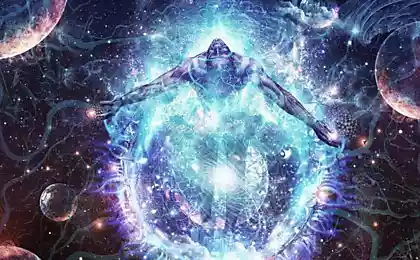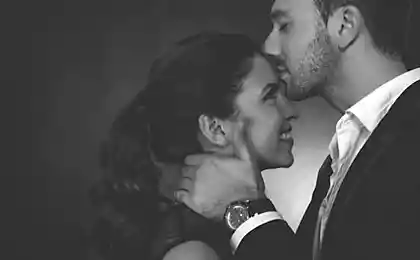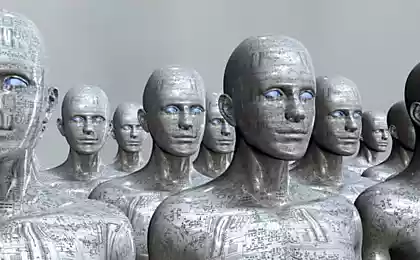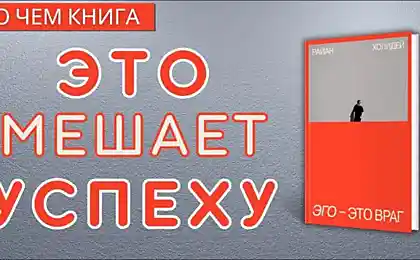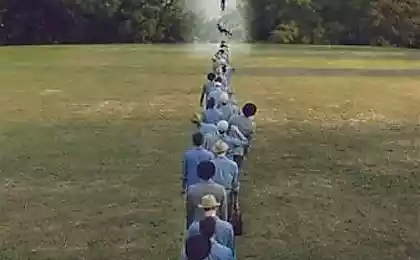453
Ego is the center of our consciousness
On the Internet and around psychological literature popular idea of renouncing the ego or killing him for self-improvement. Few people pay attention to the "sewn" add to it: we have something in there that is hierarchically higher than ego. It fights against ego, eventually defeating him. Who is this with you, who has to kill the ego?

IN THE MAZE BOUNDARIES
Formal definitions of ego is about the same as the schools of psychology. But speaking at an intuitive level, that the ego is a command center inside of us that decides and controls our behavior. This is what we mean when we say "I". According to the famous philosopher Ken Wilber, each time we say or think "I", we draw the line that separates what we consider ourselves, from the rest.
The trick is that we do it differently depending on the context. The most obvious way to draw the line on the surface of our skin. Everything inside is "I", outside "not-I". That's what we think when we say "I sit on the chair" or "my car broke down". But saying "my leg hurts", we create a second border inside the first. Between these two boundaries remain "my thoughts", "my desire", "my body" and much more. But what is inside the second border, and have an ego. This is what we mean by "I", saying "I disagree". Continuing this logic, we can assume that saying "my ego", we spend a third border within the second. Outside this boundary is the "true self", which makes "the refusal of the ego." But there is a problem. Control center of the psyche it is advisable to still be intact. When we cut off from some parts of it and declare them "not-a", then its management functions they do not lose. According to Jung, these rejected fragments of the ego are the Shadow, operating in parallel and usually against the main part of the ego. Jung argued that at a certain stage of development of these pieces must afford to return, to unite with the main part of the ego. So spiritual development is not due to the additional boundaries, but rather with erasing.
EGO IN THE INTERIOR
Jung defined consciousness as the totality of elements of the psyche that is available to ego (and the unconscious, respectively – those are not available). That is, if consciousness is a room, then the ego is its occupant. Room does nothing itself, but the way it is organised largely determines how and what happens in it. If your room is chaotically cluttered with the old stuff, nothing new there put; if it has a lot of dust and old rags, that will probably infest the mouse, and if the Windows do not have grids, the occupant of this room will be constantly pestering insects...
We may think that consciousness does something, but their activity here is not more than the arm of the sofa, on which you constantly bump my knee. Space is not attacking you, it's just organized so that you are uncomfortable and painful to live in it. And of course, the arrangement of this room can not influence the occupant. The spacious room of the mind of a Buddhist monk ego relaxed snoozing on the Mat, opening one eye only as needed.
Did you ever work in a crowded room full of junk, on a small free piece littered with things of the table, trying hard to fit into the allotted space and constantly controlling, as if not to touch something with your elbow? Remember the feeling of tension and compression throughout the body, especially in neck and shoulders? This voltage is Franz Alexander, the founder of one of the first methods of body-oriented psychotherapy, called the "primary control" – the main reflex, which controls all the other reflexes. That is the same "ego" in a sense. Ego can be compared with the main Manager on the account. Effective organization of the current processes established that small problems are solved in the field, and General Manager no one sees it because most of the time, busy long-term planning and search prospects. Such a Manager understands that the work is done by professionals, and he is there to help them as its modest forces.
I remember that Stephen Covey talked about the General Manager of the organization, who came to the heads of branches and instead demand report, said, "What can I do? How to solve the problem here my experience could help you?" From the side it may seem, it seems to be idling, and even not always clear, it is in the workplace or not.
In the Slavic-clutter organization from those that don't need to go far, the Manager goes: one shoelace will tie, another nose wipe. This Manager not only works sixteen hours a day as a workhorse, but also believes that it is important everyone in the company, because without it everything will fall apart. He, of course, right. If we are in such a situation we begin to "fight the ego" and to bind the Manager's hands, with a high probability in a few weeks, the entire office will be screwed. I mean in some crisis or having a nervous breakdown.
Our “I” is not the same image or idea, dwelling somewhere in the depths of the brain, and very real, living and pulsating organism. In order to know ourselves, we need to feel your body. Loss of sensation in any part of the body means the loss of some particles myself... This does not mean that man must abandon his ego or bring him as a sacrifice. It just means that the ego understands and accepts its subordinate role as the organ of consciousness, not as the sovereign master of the body.
Alexander Lowen, one of the founders of body-oriented psychotherapy All this violent ego-activity in the form of incessant internal dialogue, suspiciousness, perfectionism, procrastination 1, self-justification, zamparini and other growing – no problem. The real problem one – the mess in my head. Ego is just trying to somehow organize a cluttered space and portugual cockroaches from the working surface. And the fact that he has to do this almost all day, the great honor of your room does not.
1 Procrastination – the tendency to the constant "procrastination" of unpleasant thoughts and deeds. It would have had a smaller task, it would not eat so much "CPU time". If you had built boundaries and organized protection of information oppression, then every other advertising image are not reflected on your helpless psyche of additional affective "want". If less unfinished undertakings was suspended from the ceiling of your room by Zeigarnik effect 2, there would be more space and energy for new cases. And the system priorities and goals would be much easier each time to solve the question "what to do right now." If not lying at the corners of mossy intracta about the fact that you are only the sum of marks that you have given others and, therefore, it is necessary to try all like, it would not have to spend as much time designing scenarios for the future and considering them strangers. And so on...
2 Zeigarnik Effect is the psychological effect consists in the fact that a person remembers better interrupted classes completed.
WITHOUT UNNECESSARY MOVEMENTS
And now I've narrowed it down to cleaning the head, that is to psychotherapy. What are you still in therapy waiting for? In the process of cleaning erased many borders.
First, between the personalities. So, now you can access any of your psychological resources when you wish, not just in certain "runs" the personality of situations.
Second, accept the parts of the ego and repressed Shadow the disadvantages.
Thirdly, between polar black and white views, there is a whole bunch of tones and so on. The ego becomes more strong and solid, but makes less "wasted motion", and the border becomes, for example, is much less "angular" in the sense that now it is much harder to "hurt". While the battles of an ordinary man – with an ego of others, the greatest battle wise will battle with their own ego. Whereas in the first case, the victory of the ordinary person only temporary, the victory of the wise over their own egos timeless.
Inat Hidayat Khan, Indian Sufi, philosopher and musician Spiritual teachers of the East and West argue that in the end (at the "higher levels of consciousness development") disappear and the person experiences a state of oneness with the Universe. Traditional psychology does not look so far away, and you also do not have. As for nearby horizons, here's how Ken Wilber describes the first postakocsi level: "is the Union of mind, body and emotions in the unity of a higher order, a deeper integrity... when you first can give your mind the flesh, and the flesh mind." Judging by the description – quite a cool thing, not as a stepping stone to something higher, but just by itself. I hope I'll meet you there.
Source: psyh.ru
Source: /users/1080

IN THE MAZE BOUNDARIES
Formal definitions of ego is about the same as the schools of psychology. But speaking at an intuitive level, that the ego is a command center inside of us that decides and controls our behavior. This is what we mean when we say "I". According to the famous philosopher Ken Wilber, each time we say or think "I", we draw the line that separates what we consider ourselves, from the rest.
The trick is that we do it differently depending on the context. The most obvious way to draw the line on the surface of our skin. Everything inside is "I", outside "not-I". That's what we think when we say "I sit on the chair" or "my car broke down". But saying "my leg hurts", we create a second border inside the first. Between these two boundaries remain "my thoughts", "my desire", "my body" and much more. But what is inside the second border, and have an ego. This is what we mean by "I", saying "I disagree". Continuing this logic, we can assume that saying "my ego", we spend a third border within the second. Outside this boundary is the "true self", which makes "the refusal of the ego." But there is a problem. Control center of the psyche it is advisable to still be intact. When we cut off from some parts of it and declare them "not-a", then its management functions they do not lose. According to Jung, these rejected fragments of the ego are the Shadow, operating in parallel and usually against the main part of the ego. Jung argued that at a certain stage of development of these pieces must afford to return, to unite with the main part of the ego. So spiritual development is not due to the additional boundaries, but rather with erasing.
EGO IN THE INTERIOR
Jung defined consciousness as the totality of elements of the psyche that is available to ego (and the unconscious, respectively – those are not available). That is, if consciousness is a room, then the ego is its occupant. Room does nothing itself, but the way it is organised largely determines how and what happens in it. If your room is chaotically cluttered with the old stuff, nothing new there put; if it has a lot of dust and old rags, that will probably infest the mouse, and if the Windows do not have grids, the occupant of this room will be constantly pestering insects...
We may think that consciousness does something, but their activity here is not more than the arm of the sofa, on which you constantly bump my knee. Space is not attacking you, it's just organized so that you are uncomfortable and painful to live in it. And of course, the arrangement of this room can not influence the occupant. The spacious room of the mind of a Buddhist monk ego relaxed snoozing on the Mat, opening one eye only as needed.
Did you ever work in a crowded room full of junk, on a small free piece littered with things of the table, trying hard to fit into the allotted space and constantly controlling, as if not to touch something with your elbow? Remember the feeling of tension and compression throughout the body, especially in neck and shoulders? This voltage is Franz Alexander, the founder of one of the first methods of body-oriented psychotherapy, called the "primary control" – the main reflex, which controls all the other reflexes. That is the same "ego" in a sense. Ego can be compared with the main Manager on the account. Effective organization of the current processes established that small problems are solved in the field, and General Manager no one sees it because most of the time, busy long-term planning and search prospects. Such a Manager understands that the work is done by professionals, and he is there to help them as its modest forces.
I remember that Stephen Covey talked about the General Manager of the organization, who came to the heads of branches and instead demand report, said, "What can I do? How to solve the problem here my experience could help you?" From the side it may seem, it seems to be idling, and even not always clear, it is in the workplace or not.
In the Slavic-clutter organization from those that don't need to go far, the Manager goes: one shoelace will tie, another nose wipe. This Manager not only works sixteen hours a day as a workhorse, but also believes that it is important everyone in the company, because without it everything will fall apart. He, of course, right. If we are in such a situation we begin to "fight the ego" and to bind the Manager's hands, with a high probability in a few weeks, the entire office will be screwed. I mean in some crisis or having a nervous breakdown.
Our “I” is not the same image or idea, dwelling somewhere in the depths of the brain, and very real, living and pulsating organism. In order to know ourselves, we need to feel your body. Loss of sensation in any part of the body means the loss of some particles myself... This does not mean that man must abandon his ego or bring him as a sacrifice. It just means that the ego understands and accepts its subordinate role as the organ of consciousness, not as the sovereign master of the body.
Alexander Lowen, one of the founders of body-oriented psychotherapy All this violent ego-activity in the form of incessant internal dialogue, suspiciousness, perfectionism, procrastination 1, self-justification, zamparini and other growing – no problem. The real problem one – the mess in my head. Ego is just trying to somehow organize a cluttered space and portugual cockroaches from the working surface. And the fact that he has to do this almost all day, the great honor of your room does not.
1 Procrastination – the tendency to the constant "procrastination" of unpleasant thoughts and deeds. It would have had a smaller task, it would not eat so much "CPU time". If you had built boundaries and organized protection of information oppression, then every other advertising image are not reflected on your helpless psyche of additional affective "want". If less unfinished undertakings was suspended from the ceiling of your room by Zeigarnik effect 2, there would be more space and energy for new cases. And the system priorities and goals would be much easier each time to solve the question "what to do right now." If not lying at the corners of mossy intracta about the fact that you are only the sum of marks that you have given others and, therefore, it is necessary to try all like, it would not have to spend as much time designing scenarios for the future and considering them strangers. And so on...
2 Zeigarnik Effect is the psychological effect consists in the fact that a person remembers better interrupted classes completed.
WITHOUT UNNECESSARY MOVEMENTS
And now I've narrowed it down to cleaning the head, that is to psychotherapy. What are you still in therapy waiting for? In the process of cleaning erased many borders.
First, between the personalities. So, now you can access any of your psychological resources when you wish, not just in certain "runs" the personality of situations.
Second, accept the parts of the ego and repressed Shadow the disadvantages.
Thirdly, between polar black and white views, there is a whole bunch of tones and so on. The ego becomes more strong and solid, but makes less "wasted motion", and the border becomes, for example, is much less "angular" in the sense that now it is much harder to "hurt". While the battles of an ordinary man – with an ego of others, the greatest battle wise will battle with their own ego. Whereas in the first case, the victory of the ordinary person only temporary, the victory of the wise over their own egos timeless.
Inat Hidayat Khan, Indian Sufi, philosopher and musician Spiritual teachers of the East and West argue that in the end (at the "higher levels of consciousness development") disappear and the person experiences a state of oneness with the Universe. Traditional psychology does not look so far away, and you also do not have. As for nearby horizons, here's how Ken Wilber describes the first postakocsi level: "is the Union of mind, body and emotions in the unity of a higher order, a deeper integrity... when you first can give your mind the flesh, and the flesh mind." Judging by the description – quite a cool thing, not as a stepping stone to something higher, but just by itself. I hope I'll meet you there.
Source: psyh.ru
Source: /users/1080
Photos of happy couples on Facebook cause irritation
The ban on talking on the phone does not make the roads safer

